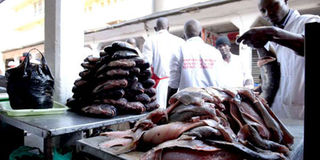Breaking News: At least 10 feared to have drowned in Makueni river
Nothing fishy in China imports as deficit widens

Fishmongers prepare fish fillets for sale at the City Market in Nairobi. Local fish traders say cheap imports from China are stifling their business. FILE PHOTO | SALATON NJAU
What you need to know:
- Ministry says Kenya has an annual deficit of 800,000 tonnes of fish, which can only be filled through imports.
Kenya will continue importing fish to meet the widening deficit, amid outcry from traders over cheaper products from China.
Fisheries Principal Secretary Micheni Ntiba says Kenya has an annual deficit of 800,000 tonnes of fish, which can only be filled through imports.
In an interview with Smart Company, Prof Ntiba said the shortage is expected to persist even in the coming years as Lake Victoria is currently suffering from depleted stocks, despite being a major source of fish in Kenya.
The stocks have been depleted because of the use of wrong fishing gears and bad practices such as overfishing.
Prof Ntiba notes that Kenya’s per capita consumption of fish has gone up to seven kilogrammes from two kilogrammes in 2008.
“We do not have an alternative over fish importation. It is a fact that we currently do not have enough fish in the country and we are required to import in order to meet the growing demand,” said Prof Ntiba.
The PS noted that there is nothing wrong with China imports saying this has been going on for years. He added that Kenya has also been exporting the commodity to the Asian nation.
Kenya is trying to fill the deficit by promoting aquaculture through the Economic Stimulus Programme that started with President Kibaki’s regime.
When the programme was established in 2008, fish production was at 1,000 tonnes a year, a figure that has grown to 22,000 tonnes.
Aquaculture provides up to 24 per cent of the country’s total fish production, with the balance coming from lakes and oceans.
The PS noted that the government is taking corrective measure such as restocking of Lake Victoria and curbing illegal fishing to boost local stocks.
Kenya also exports fish, mainly the Nile Perch that has not been popular with Kenyans in terms of consumption.
“In 1988 Kenyans were not consuming the Nile Perch and we have been exporting it to other countries. However, the trend has changed and the majority of us are now eating this type of fish,” said the PS.
Kenya is yet to attain the full potential in fishing at the Indian Ocean. Under the Exclusive Economic Zones, local fishermen are allowed to fish up to 200 nautical miles from the Kenyan shores, but they are operating at below five nautical miles for lack of appropriate fishing gear to explore the deep sea waters.
This has given room to developed nations with advanced gears to explore Kenya’s fishing potential. Illegal fishermen are also using the opportunity to exploit Kenya’s resources.
The African Union (AU) is pushing for uniform fishing laws and increased investment in the sector to control the Sh250 billion worth of resources currently trawled away by these advanced nations.
Mr Bruce Mukanda, a senior programme officer at the AU- Inter African Bureau for Animal Resources says all member states need to adopt a framework already developed by the continental body.
“At the continental perspective, we are looking at individual country policies as we aim to harmonise them across the continent in order to harness this huge fisheries resource,” said Mr Mukanda.




